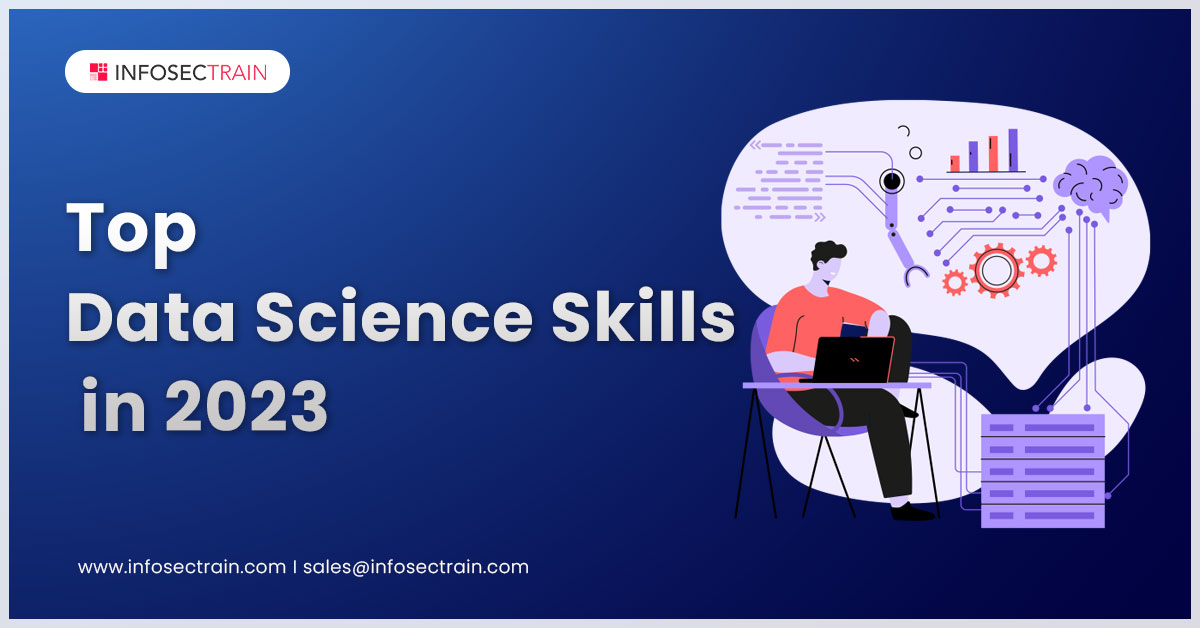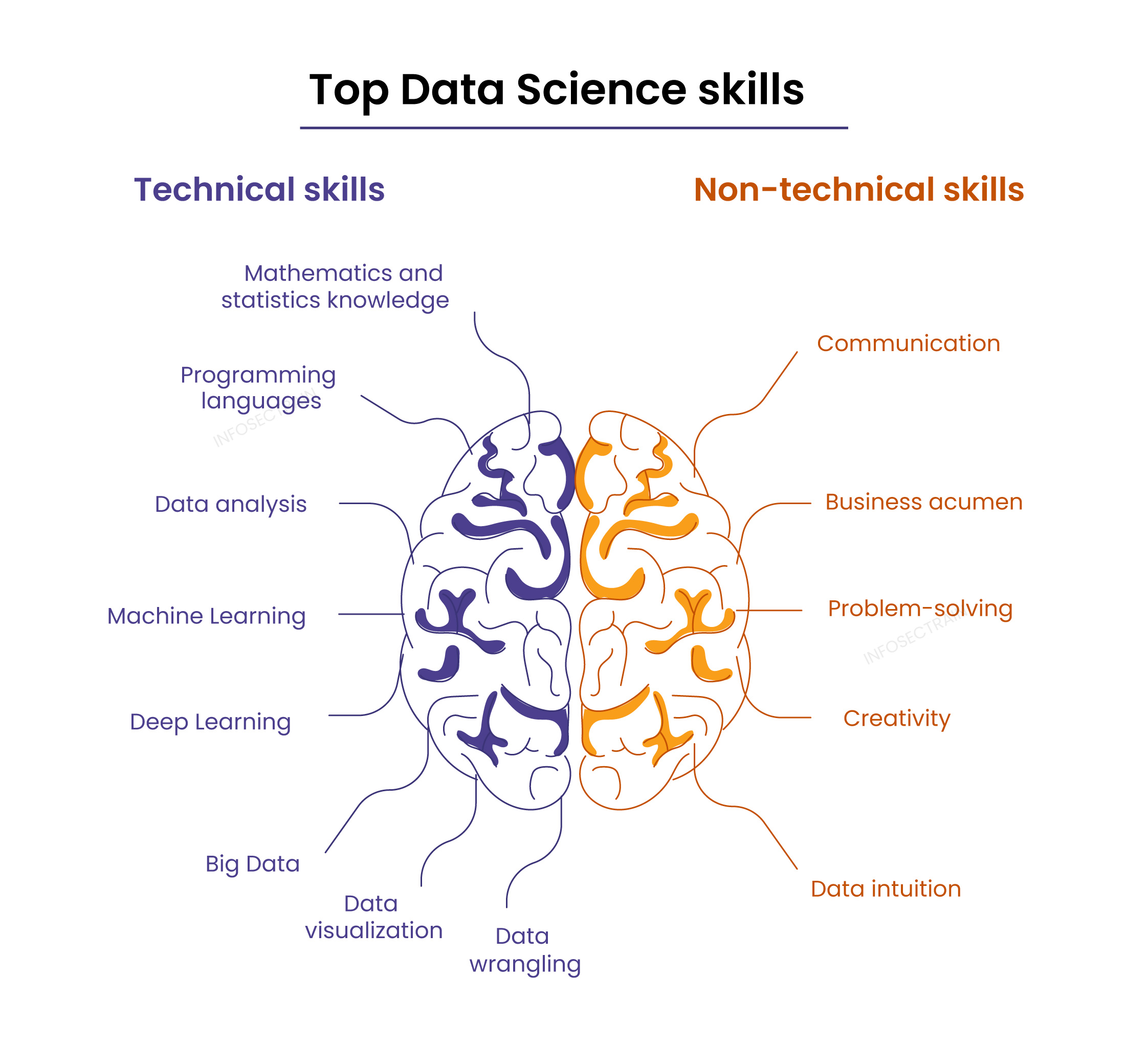Top Data Science Skills in 2023
Data science is a field that involves scientific methods, processes, algorithms, and systems to extract insights and knowledge from structured and unstructured data. It involves collecting, processing, analyzing, and interpreting large and complex data sets using various tools and techniques. The objective of data science is to identify patterns, trends, and relationships within the data and use this information to make data-driven decisions.

As organizations develop and collect more data, they require professionals with the skills and expertise to extract insights from the data. So, the demand for Data Scientists has increased with the growing significance of data in business decisions, the exponential growth of data from various sources, and the widespread usage of artificial intelligence and machine learning technology.
Table of Contents
Who is a Data Scientist?
Responsibilities of Data Scientist
Top Data Science skills
Data Scientist technical skills
Data Scientist non-technical skills
In this blog, we will give you an overview of who a Data Scientist is and what Data Scientist’s skills and responsibilities are.
Who is a Data Scientist?
A Data Scientist is a skilled professional who uses various techniques and tools to extract insights from large and complex datasets. They have expertise in statistical analysis, machine learning, data mining, and data visualization techniques to analyze data and uncover patterns that can inform business decisions. They play a key role in developing and implementing data-driven strategies, improving product offerings, and enhancing customer experiences. They can work in various industries like healthcare, finance, marketing, e-commerce, and technology.
Responsibilities of Data Scientist
The responsibilities of a Data Scientist can vary depending on the industry, companies, and job role. However, some typical responsibilities of a data scientist include the following:
- Collect and process large and complex data sets from various sources.
- Identify patterns, trends, and relationships within the data.
- Analyze and interpret data using statistical and machine learning techniques.
- Ensure data privacy and security measures are in place to protect sensitive information.
- Build and deploy predictive models to support decision-making processes.
- Stay up-to-date with the latest data science tools, techniques, and trends.
- Collaborate with cross-functional teams, such as Business Analysts, Engineers, and Product Managers.
Top Data Science skills
Here are some top skills for Data Scientists:

Data Scientist technical skills:
- Mathematics and statistics knowledge: Data Scientists should have a strong foundation in mathematics and statistics to analyze data and build models. They need to be comfortable with concepts like probability, linear algebra, calculus, and statistical inference.
- Programming languages: A good Data Scientist should be proficient in programming languages like Python, R, Java, and SQL. Python and R are the most popular languages used in Data Science. Python is widely used for data manipulation and analysis, while R is popular for statistical analysis and machine learning.
- Data analysis: Data Scientists should be able to analyze data using various techniques such as exploratory data analysis, regression analysis, and hypothesis testing. They should be skilled in identifying patterns and trends in data and communicating their findings to non-technical stakeholders.
- Machine Learning: Data Scientists should have a deep understanding of machine learning algorithms and techniques like linear regression, decision trees, random forests, neural networks, etc. They should be able to implement these algorithms in Python or R and interpret their results.
- Deep Learning: Deep Learning is a critical skill for Data Scientists as it enables them to build and deploy predictive models that can accurately classify and analyze large datasets. Data Scientists should have a strong foundation in machine learning, statistics, and linear algebra. They should also have experience with deep learning frameworks such as Keras, PyTorch, and TensorFlow.
- Big Data: Data Scientists should have knowledge of Big Data tools and technologies used for managing and processing large datasets, such as Hadoop, Spark, MapReduce, and NoSQL databases. It enables them to extract valuable insights and knowledge from big data, crucial for making informed business decisions.
- Data visualization: Data Scientists should be proficient in data visualization tools like Tableau, Power BI, and matplotlib as it provides a clear insight into their data-driven insights. Visualizations help convey complex ideas clearly and concisely, making it simpler for stakeholders to comprehend the impact of data analysis on the business.
- Data wrangling: Data Scientists should be proficient in data wrangling. It is an essential step in the data science process that involves cleaning, transforming, and preparing raw data for analysis. It ensures the data is accurate, consistent, and suitable for analysis, which is essential for generating accurate insights and predictions.
Data Scientist non-technical skills:
- Communication: Data Scientists should have strong communication skills to communicate complex ideas and recommendations effectively to technical and non-technical stakeholders.
- Business acumen: Data Scientists should have a good understanding of business operations and objectives to deliver relevant and actionable insights to decision-makers.
- Problem-solving: Data Scientists should be able to solve complex problems and identify data-driven solutions aligned with business objectives. They should be able to identify the root cause of a problem and come up with solutions.
- Creativity: Data Scientists should be able to think creatively and outside the box to identify innovative solutions to complex problems.
- Data intuition: Data intuition is the ability to understand the underlying structure and patterns in data. A Data Scientist with exceptional data intuition skills can quickly identify relevant data, recognize patterns, and develop effective data-driven solutions to make informed decisions and deliver actionable insights from complex data sets.
You can also check out related blogs:
- All About Data Science
- Why choose “Data Science with Cybersecurity” with InfosecTrain?
- Cybersecurity Vs. Data Science
- Top Python and R Libraries for Data Science
Data Science with InfosecTrain
InfosecTrain is a proficient technology and security training and consulting firm specializing in information security courses and services. In InfosecTrain’s “Data Science with Python and R” training course, you can learn all the fundamental data science principles from industry experts. You can also look into our “Data Science for Cyber Security” training course, which aims to use Data Science skills to mitigate cybersecurity threats. With InfosecTrain, you can leverage several benefits, including a flexible training schedule, post-training assistance, and access to recorded videos.




 1800-843-7890 (IN)
1800-843-7890 (IN) sales@infosectrain.com
sales@infosectrain.com
 1800-843-7890 (India)
1800-843-7890 (India) 
